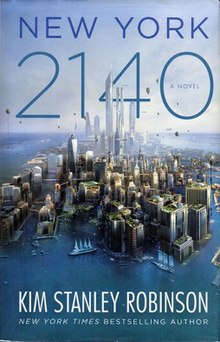 First edition First edition | |
| Author | Kim Stanley Robinson |
|---|---|
| Cover artist | Stephan Martiniere |
| Language | English |
| Genre | Science fiction |
| Publisher | Orbit Books |
| Publication date | 2017 |
| Publication place | United States |
| Media type | Print (Hardback & Paperback) |
| Pages | 624 pages |
| ISBN | 978-0-316-26234-7 |
New York 2140 is a 2017 climate fiction novel by American science fiction author Kim Stanley Robinson. The novel is set in a New York City that has been flooded and altered by rising water. The novel received generally positive reviews.
Setting
The novel occurs mostly in a fictional future New York City, permanently inundated by two major rises in seawater levels caused by climate change. Most of New York City is permanently underwater, however, people still live in the upper floors of the buildings, much like in the Venice of today. Robinson has said that the novel does not take place in the same "future history" as his novel 2312.
Most of Manhattan below 46th Street is flooded, and has earned the nickname "SuperVenice". Several of the book's characters live in the MetLife Tower on 23rd Street, which the tenant association has outfitted with flood-prevention mechanisms and boat storage. Robinson chose to prominently feature the building as it was designed to resemble the St Mark's Campanile in Venice.
The affluent live in newly constructed skyscrapers in Uptown Manhattan and near The Cloisters, as both locations remain above water. Denver has replaced New York as the center of American finance and culture, and much of the United States has been deliberately abandoned by humans in order to make room for wildlife. Robinson has previously addressed sea level rise directly and indirectly in his works Aurora, 2312, and the Mars trilogy.
Scientific accuracy
The book is set in a New York City suffering a 50-foot rise in sea-water. However, scientists suggest a rise between 3 and 15 feet (0.9 and 5 metres) is more likely by 2140. A rise on that scale would likely mean that some portions of Manhattan, Brooklyn, and Queens would be flooded, but not to the extent as featured in the novel. However, some estimates indicate sea-level rises even higher than depicted in the novel (up to 72 feet/22 metres) by the year 2300, if global warming increases to 5°C (relative to pre-industrial levels). According to Robinson, he set the novel in 2140 as he wanted the setting to be recognizable, while the sea-level rise in the novel was possible but "extreme".
Themes
The novel is critical of capitalism, unregulated financial systems, and market economies. Many of the citizens of the city live in co-ops and rely on organizations that pool resources, while the affluent live in former office buildings and newly built skyscrapers above 125th Street and in Yonkers.
Reception
According to the literary criticism aggregator Literary Hub, critics gave the novel generally positive reviews. Gerry Canavan, writing for the Los Angeles Review of Books, referred to the novel as a further step in Robinson's " construction of a huge metatextual history of the future...distributed across overlapping but distinct and mutually irreconcilable texts".
In 2022 article published by The New York Times about Robinson, Alexandra Alter referred to the novel as "oddly uplifting".
Ken Burns has referred to the novel as "wonderful", saying that it "... disasters and climate change, but it also has sort of human adaptability, and it’s really spectacular."
References
- Valentine, Genevieve (19 March 2017). "In '2140,' New York May Be Underwater, But It's Still Home". NPR. Retrieved 5 May 2017.
- Liptak, Andrew (6 May 2020). "Kim Stanley Robinson on His Next Novel, The Ministry for the Future". Tor.com. Retrieved 17 February 2023.
- ^ Swearingen, Jake (27 March 2017). "Kim Stanley Robinson's New York 2140: To Save the City, We Had to Drown It". NYMag. Retrieved 5 May 2017.
- ^ Canavan, Gerry (11 March 2017). "Utopia in the Time of Trump". Los Angeles Review of Books. Retrieved 12 September 2017.
- Kopp, Robert (12 March 2017). "New York 2140: A novelist's vision of a drowned city that still never sleeps". Salon. Retrieved 5 May 2017.
- ^ Rutkoff, Aaron (8 March 2017). "Only Sci-Fi Can Drown Manhattan and Make You Want to Live There". Bloomberg. Retrieved 5 May 2017.
- McVeigh, Karen (26 June 2023). "'It's absolutely guaranteed': the best and worst case scenarios for sea level rise". The Guardian. Retrieved 21 July 2023.
- Rothman, Joshua (27 April 2017). "Kim Stanley Robinson's Latest Novel Imagines Life in an Underwater New York". The New Yorker. Retrieved 5 May 2017.
- "New York 2140". Literary Hub. 14 March 2017. Retrieved 12 September 2017.
- Alter, Alexandra (11 May 2022). "A Sci-Fi Writer Returns to Earth: 'The Real Story Is the One Facing Us'". The New York Times. Retrieved 17 February 2023.
- "Ken Burns Wishes More People Would Call Willa Cather a Great American Novelist". The New York Times. 20 October 2022. Retrieved 19 July 2023.
External links
| Kim Stanley Robinson | |||||||||
|---|---|---|---|---|---|---|---|---|---|
| Bibliography | |||||||||
| Novels |
| ||||||||
| Collections |
| ||||||||
- 2017 American novels
- American science fiction novels
- Novels by Kim Stanley Robinson
- Novels set in the 2140s
- Novels set in New York City
- Orbit Books books
- Environmental fiction books
- Climate change novels
- Novels about cities
- Novels about floods
- Novels about geopolitics
- Novels about social issues
- Works about hurricanes
- Fiction about economics
- Books critical of capitalism